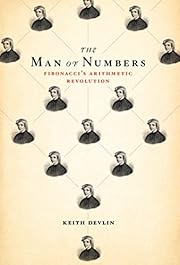

Click on a thumbnail to go to Google Books.
|
Loading... The Man of Numbers: Fibonacci's Arithmetic Revolution (original 2011; edition 2011)by Keith Devlin
Work InformationThe Man of Numbers: Fibonacci's Arithmetic Revolution by Keith Devlin (2011)
 Books Read in 2013 (677) No current Talk conversations about this book.   ) )"The Man of Numbers: Fibonacci's Arithmetic Revolution" enthusiastically summarizes the little that is known about Leonardo of Pisa, later more famously called Fibonacci. Those who read medieval primary texts have become used to the dearth of direct evidence related to such texts, as well as the admirable, if Herculean, labors medievalists are forced to perform to prove the most basic biographical details. In the case of Leonardo of Pisa, the proof for his role in the "arithmetic revolution" has been fairly well-established, and is nicely summarized here. Well-known for his Fibonacci sequence, his greater contribution may have been the role he played in the transmission of arithmetic and algebra from Moslem North Africa to medieval Italy. Interestingly, this transmission appears to have proceeded along two tracks: First, in a formal, Latin primer on algebra--the famous Liber Abaci (1202)--via the educated elite, and second, through transmission to the Tuscan mercantile community in a format more suitable for the problems that would interest them via a lost primer--Di minor guisa--on commercial arithmetic for the "abbacus schools." Thus, Leonardo of Pisa seems to have played a significant role in both the rebirth of classical arithmetic and science, and the economic revolution that was already beginning to pull much of Italy into its cultural renaissance.  This review was written for LibraryThing Early Reviewers. This review was written for LibraryThing Early Reviewers.known as "Fibonacci". Leonardo is best known for the number sequence, the "Fibonacci Numbers", named after him. (1, 1, 2, 3, 5, 8, 13, 21, 34, ... Can you guess the pattern?) Far more important than this sequence, however, was Leonardo's introduction of the familiar Arabic numerals to Europe. These are the numbers (0, 1, 2, 3, 4, 5, 6,...) that we use now for nearly everything, and they replaced the older Roman numerals (I, II, III, IV, V, VI,...) that were in use in Europe prior to the thirteenth century. The unfortunate fact is that very little is known about Leonardo, apart from some of his writing. This makes his story rather difficult to tell, so Devlin makes up for the lack of hard data by describing life during Leonardo's time, and speculating intelligently about various aspects of his education, travels and motivations for his work. Most interestingly, he describes the tremendous impact the introduction of Arabic numerals had on Western culture, and the way ordinary calculation was so profoundly affected. Devlin has a well-earned reputation as a master of telling mathematical stories, and while I would not consider it his best work, this book does not disappoint on that score. no reviews | add a review
In 2000, Keith Devlin set out to research the life and legacy of the medieval mathematician Leonardo of Pisa, popularly known as Fibonacci, whose book Liber abbaci has quite literally affected the lives of everyone alive today. Although he is most famous for the Fibonacci numbers--which, it so happens, he didn't invent--Fibonacci's greatest contribution was as an expositor of mathematical ideas at a level ordinary people could understand. In 1202, Liber abbaci--the "Book of Calculation"--Introduced modern arithmetic to the Western world. Yet Fibonacci was long forgotten after his death, and it was not until the 1960s that his true achievements were finally recognized. Finding Fibonacci is Devlin's compelling firsthand account of his ten-year quest to tell Fibonacci's story. Devlin, a math expositor himself, kept a diary of the undertaking, which he draws on here to describe the project's highs and lows, its false starts and disappointments, the tragedies and unexpected turns, some hilarious episodes, and the occasional lucky breaks. You will also meet the unique individuals Devlin encountered along the way, people who, each for their own reasons, became fascinated by Fibonacci, from the Yale professor who traced modern finance back to Fibonacci to the Italian historian who made the crucial archival discovery that brought together all the threads of Fibonacci's astonishing story. Fibonacci helped to revive the West as the cradle of science, technology, and commerce, yet he vanished from the pages of history. This is Devlin's search to find him. No library descriptions found. |
LibraryThing Early Reviewers AlumKeith Devlin's book Man of Numbers was available from LibraryThing Early Reviewers. Current DiscussionsNonePopular covers
 Google Books — Loading... Google Books — Loading...RatingAverage: (3.44) (3.44)
Is this you?Become a LibraryThing Author. |
||||||||||||||||||||||||||||||||||||||||||||||||||||||||||||||||||||||||||||||||||||||||||||||||||||||||||||||||||||||||||||||||||||||